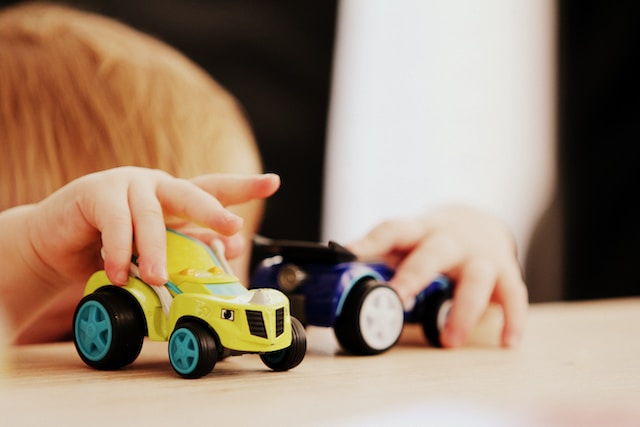The Crucial Role of Imagination and Play in Nurturing Healthy Childhoods

When was the last time you took a moment to truly observe the power of your child's imagination? Have you ever watched as their creative play unfolded effortlessly before your eyes, without any external influence? It is during these moments of play that children are at their most natural and joyful state. By actively engaging in play, you have the incredible opportunity to witness the formation of your child's character, problem-solving abilities, and self-confidence. Moreover, their imagination and playful experiences become a unique form of communication, allowing them to express themselves in ways they may struggle to do verbally.
Consider, for instance, a situation where your daughter feels distressed about a child being bullied. In response, she may employ her imagination to conjure up scenarios where the underdog emerges victorious, utilizing her stuffed animals as key players in the narrative. Similarly, if your son is grappling with stage fright ahead of a school play, he may rehearse his lines in front of an imaginary audience or with toy army men, seeking comfort and familiarity in these playful interactions. While children may not explicitly voice their worries, their play becomes a window into their inner world.
Extensive research has provided ample evidence of the profound benefits derived from play and imagination. Let's explore some compelling reasons why engaging in play with your children is essential for understanding them better and fostering their healthy development.
The Language of Imagination and Play
Have you ever attempted to delve into your child's feelings or inquire about their experiences at school, only to be met with one-word answers or a bewildered “I don't know”? Although these responses may prove frustrating for parents, it is important to recognize that from a child's perspective, they are genuinely accurate. Until they reach their pre-teen years, children lack the ability to reason abstractly. Consequently, if you truly desire to comprehend what transpires within your child's world, immersing yourself in play with them is an invaluable approach. Active engagement in fun and imaginative experiences tends to evoke sharing and conversation from children. Toys serve as their vocabulary, and play becomes their primary language.
Expanding a Child's Emotional Vocabulary Through Play
Children often find themselves grappling with emotions, feeling frustrated and perplexed, particularly since emotions frequently manifest as physical sensations in their bodies. They struggle to grasp the significance of what they are experiencing and lack the vocabulary to express their feelings adequately. By actively participating in play with your children, you facilitate the development of their emotional vocabulary, aiding them in identifying and articulating their emotions. For instance, if your child jumps up and down with excitement because they get to play ball, acknowledging their emotions by saying, “You seem excited!” helps them associate the feeling of excitement with future communication, both with you and others.
Unleashing Imagination through Play
When children are provided the opportunity and freedom to engage in play, their imagination and creativity are unleashed. Playtime offers them a platform to solve various problems, navigate challenging scenarios, and confront conflicts. It serves as a practice ground for real-life situations, devoid of the usual consequences and risks. As children grapple with these scenarios, they are compelled to employ their imagination, creativity, and inventiveness. They learn to collaborate, negotiate, and problem-solve. The more they are encouraged to engage in play without constraints, the more effectively they can tap into their imagination, immersing themselves in the realms of fantasy and fun that playtime affords.

Imagination Enhances Coping Skills
One fascinating aspect of play is its ability to provide children with opportunities to navigate their stories in meaningful and constructive ways, even if their actual circumstances remain unchanged. For instance, a child may be unable to bring a deceased loved one back to life, but through imaginative play, they can engage in a game of “house” with their grandpa, pretending he is still present. Such playful experiences aid in coping with loss while allowing the child to develop new language to express their emotions.
While your child may not win the school spelling bee, they can use their imagination during playtime to award themselves a medal, fostering coping skills and nurturing self-confidence in their ability to handle disappointments. As a parent, you may find it challenging to provide direct assistance in these areas, but by actively participating in your child's play, you will witness the transformative process unfold before your eyes as they develop the capacity to navigate difficult situations.
Imagination and play are indispensable components of a healthy childhood. During play, children feel secure, content, and capable. By immersing yourself in a child's world of play, you gain access to their deepest feelings, thoughts, desires, and wishes that might otherwise remain unspoken. As an observer of your child's play, you gain invaluable insights and understanding about what truly matters to them. Furthermore, you might even find yourself invited into their play, allowing you to experience their world firsthand. Regardless of the outcome, both you and your child can revel in a newfound, meaningful mode of communication.
Last Updated on 22 June 2025
Our aim is to help our children discover their talents, realise their full potential, and develop a passion for life-long learning.





